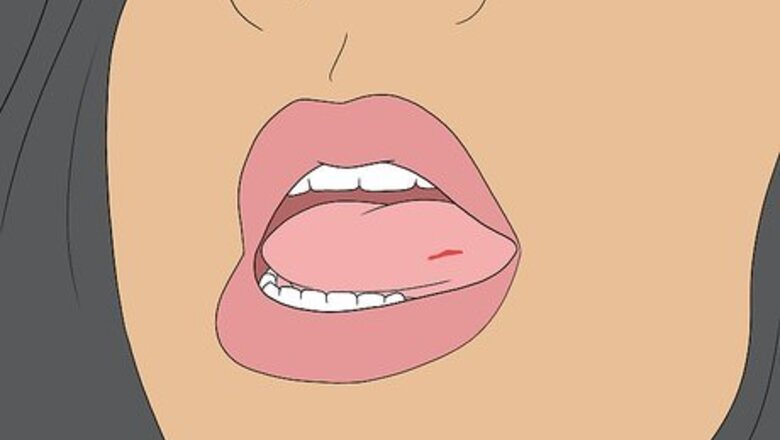
views
Sores, Patches, or Ulcers Inside Your Mouth
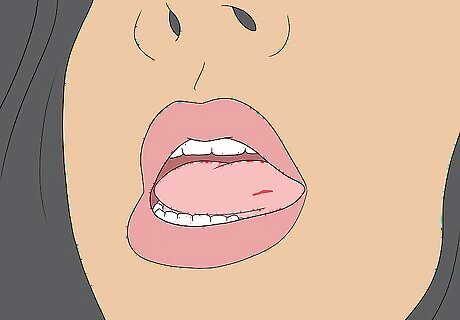
Recall if you recently bit, bumped, or burned the inside of your mouth. One of the most common causes of mouth pain is an injury to the inside of your mouth. Luckily, minor mouth injuries usually heal up on their own in a few days. If you have a sore spot on the inside of your cheek or lip, the roof of our mouth, or your tongue, try to remember if you might have: Bitten your tongue, the inside of your cheek, or the inside of your lip. When this happens, the area can sometimes swell up a little, making it easy to accidentally bite it again. Burned the inside of your mouth by eating or drinking something that was too hot. Eaten something that irritated your mouth, like spicy or acidic food.
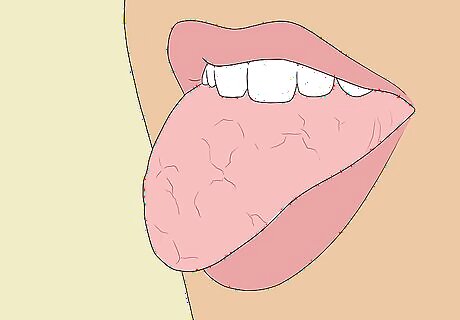
Identify dry mouth by looking for burning, dryness, and sores. Some medical conditions or medications can cause your salivary glands to stop working properly. Your mouth may feel very dry or gluey, and you may also develop uncomfortable symptoms such as a burning sensation in your mouth, a sore throat, cracked lips, and sores inside your mouth. Other common symptoms include bad breath, difficulty speaking and swallowing, and a tongue that feels dry or rough. Dry mouth can have lots of causes, so it’s important to work with your doctor to find out what’s going on. They can help you treat your symptoms and tackle whatever is causing the problem so that you can start feeling better. Common causes include certain medications and medical treatments (such as chemotherapy or radiation therapy), nerve damage, autoimmune disease, or drug use.
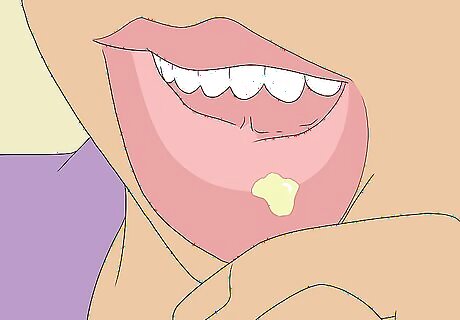
Identify canker sores by checking for small, round sores in your mouth. Canker sores are small mouth ulcers or sores that can develop almost anywhere inside your mouth, including inside your cheeks or lips, under your tongue, and on the roof of your mouth (typically near the back of the throat). Look for small, painful sores with red borders and a greyish center. Unlike cold sores, canker sores aren’t contagious. However, they can sometimes be triggered by a contagious illness, such as the flu or a common cold. Other common triggers for canker sores include stress, allergies, hormonal changes, irritating foods, and vitamin deficiencies. Your doctor may be able to help you identify and treat the cause of your canker sores. Although they’re irritating, the good news is that most canker sores are harmless. They usually heal up on their own in 3-4 days.
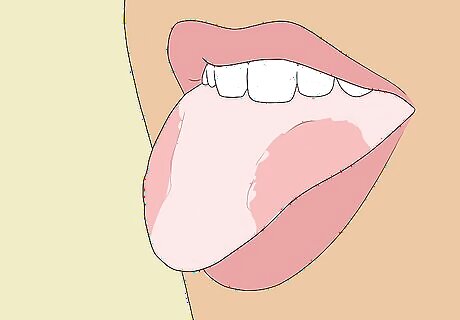
See your doctor if you have white thrush patches in your mouth. Thrush is a fungal infection that develops when the normal fungus that lives in your mouth gets overgrown. Check for white spots or patches on your tongue or the insides of your cheeks and lips. If you wipe the patches away, you may find a red, raw, sore area underneath. If you have these symptoms, call your doctor. They may prescribe an anti-fungal mouthwash or oral medication to treat your thrush. You may feel tenderness, soreness, or burning in your mouth. Your tongue might also feel unpleasantly coated or “hairy.” Oral thrush is more common in babies and children, but adults can sometimes get it as a result of taking certain medications or having a weakened immune system. If you smoke, chew tobacco, or drink heavily, you may develop a similar-looking condition called leukoplakia. Leukoplakia causes white patches, bumps, and nodules on the inside of the mouth that can sometimes become cancerous. Unlike thrush patches, these white spots usually are not painful and can’t be rubbed off.
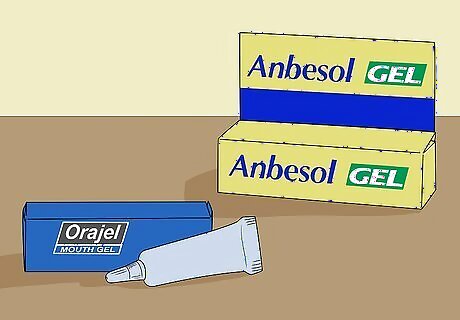
Use topical pain medications to soothe mouth sores. You can get relief from some painful mouth conditions, such as canker sores, cold sores, or minor mouth injuries, by using topical gels or ointments. Look for ointments that are designed to be used safely inside the mouth, and follow the instructions on the packaging. For example, oral pain creams or gels like Anbesol or Orajel can help soothe pain from mouth sores. Some over-the-counter medications may also help speed up the healing of mouth sores. For example, medications containing hydrogen peroxide can help canker sores heal more quickly.
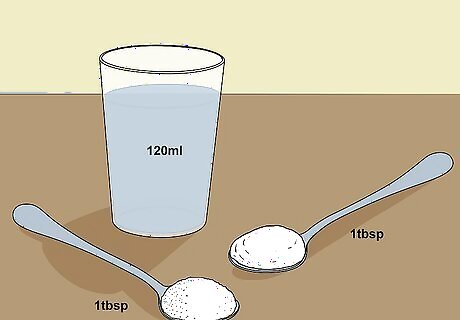
Promote healing with saltwater and baking soda rinses. Rinsing your mouth with warm saltwater or a mixture of saltwater and baking soda can keep germs at bay and may help sores in your mouth heal faster. Mix up 1 tbsp (17 g) of salt, 1 tbsp (14 g) of baking soda, and 4 fluid ounces (120 mL) of warm water, and gargle with this mixture 3-4 times a day. Spit it out when you’re done. This rinse will also help soothe pain and soreness in your mouth.
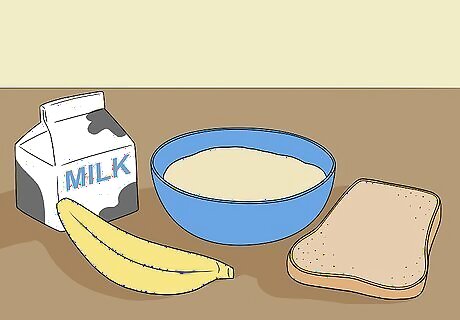
Limit foods, drinks, and other substances that could irritate your mouth. While your mouth is healing, avoid putting anything in it that could make your pain worse. This includes spicy, acidic, or very salty foods and drinks, as well as food with rough or sharp textures. Stick to soft, bland foods that are easy to chew and swallow. Other things that might irritate your mouth include alcohol, tobacco products, coffee, chocolate, and harsh mouth rinses that contain alcohol.
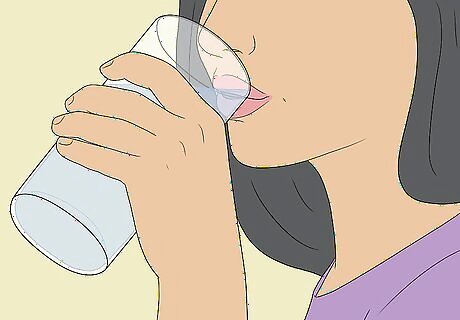
Sip on water or suck on ice chips to moisturize a dry mouth. If your mouth is sore because it’s dry, drinking a little water or sucking on some ice chips can help. Take sips of water throughout the day, and always have a glass of water with your meals. You can also relieve dry mouth symptoms by: Sucking on hard, sugar-free candies or chewing sugar-free gum Keeping a humidifier on in your room, especially at night Breathing through your nose instead of your mouth as much as possible Using an over-the-counter mouth moisturizing spray or saliva substitute, such as Mouth Kote or Oasis Moisturizing Mouth Spray
Pain in Your Teeth, Gums, or Jaw

Watch for pain and tenderness in your teeth and gums to spot dental problems. Cavities, gum disease, and dental abscesses (infections by the root of a tooth) can all cause pain. If you have nagging tooth pain or suspect a problem with your teeth or gums, make an appointment with your dentist right away. Look out for symptoms such as: Redness, swelling, and soreness in your gums Pain in your teeth, which might get worse when you chew food or eat or drink something hot or cold Tenderness or swelling in your face or jaw
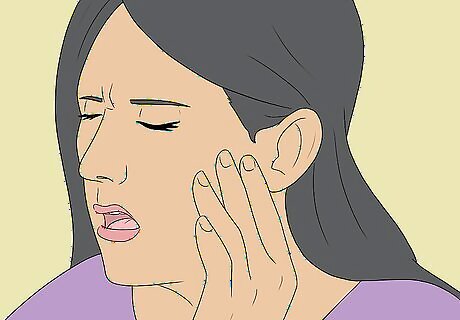
Get evaluated for TMJ problems or nerve irritation if you have jaw pain. Pain in your jaw can have a lot of causes, including inflammation of the nerves in your face or a problem with the joint between your upper and lower jaws (the temporomandibular joint, or TMJ). If you’re having this kind of pain, see your doctor so they can help you figure out what’s going on and find the right treatment for you. Sudden jaw pain can also be a sign of inflammation in the blood vessels in your face, which can lead to more serious complications like vision loss if you don’t get it treated. Call your doctor right away or go to an urgent care clinic so you can get the treatment you need to feel better. If you have pain in your left jaw along with symptoms such as difficulty breathing, pressure or pain in your chest, and fatigue or lightheadedness, get medical attention immediately. These can be signs of a heart problem.
Look out for rough flossing and brushing habits. Brushing and flossing your teeth too aggressively can cause pain in your teeth and gums. If your teeth are sensitive to heat, cold, or pressure, or if your gums and tongue feel sore, ask your dentist if you might be brushing your teeth too hard or flossing incorrectly. They’ll help you learn how to give your teeth and gums some gentler TLC! Your dentist might recommend gentler brushing, switching to a softer toothbrush, or using a toothpaste formulated for sensitive teeth or gums. When you’re flossing, gently guide the floss between your teeth with a rocking movement and follow the natural curves of your teeth. Be careful not to snap the floss up between your teeth, since this could cut your gums and cause more pain.
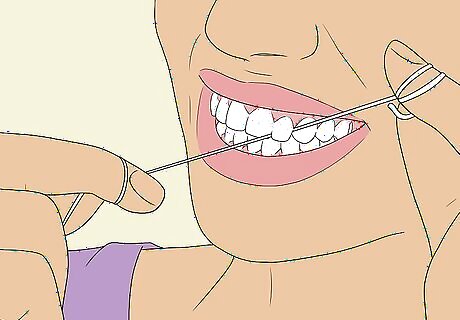
Brush and floss your teeth daily to prevent tooth and gum disease. Brush your teeth at least twice a day with a toothpaste containing fluoride to get rid of bacteria and plaque buildup on your teeth and gums. Try to floss at least once a day to remove debris and plaque from between your teeth. This will help prevent pain from tooth decay, gum disease, and inflammation due to irritating buildup between your teeth. Your dentist can show you how to brush and floss correctly to make sure that your teeth and gums stay as clean and healthy as possible. Your dentist might also recommend gently brushing or scraping your tongue to remove bacteria and built-up debris.
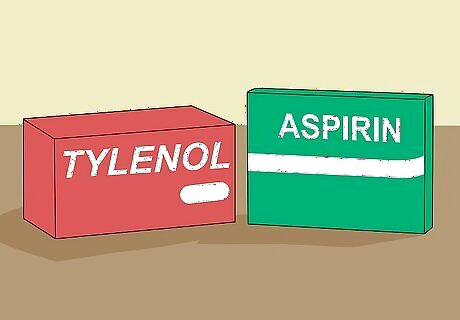
Relieve aches and inflammation with anti-inflammatory painkillers. Over-the-counter pain medications like ibuprofen (Motrin, Advil) or naproxen (Aleve) can help relieve toothaches and ease pain in your face or jaw. Always follow the directions on the package, or get advice from your doctor or dentist about how to use these medicines safely. You can also try using acetaminophen (Tylenol) by itself or in combination with an anti-inflammatory medication, such as ibuprofen. Tylenol will help soothe your pain, but it won’t reduce swelling or inflammation. Aspirin will also reduce pain and inflammation, but don’t use it if you have bleeding problems. It can also be dangerous for children or teenagers under the age of 18.
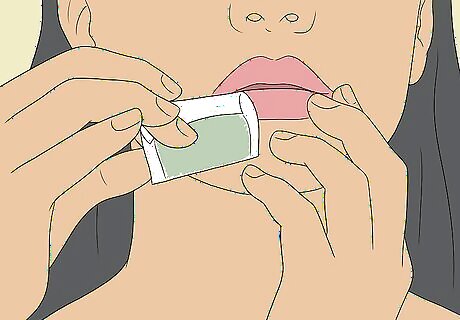
Use ice or cold teabags to soothe pain and swelling. Ice can help numb your pain and bring down any inflammation or swelling in your mouth or jaw. Try sucking on some ice chips or rubbing a piece of ice directly on the sore spot. You can also try eating a popsicle or drinking some cold water or iced tea. Holding a cold, wet tea bag on a canker sore can also bring relief.
Painful, Chapped, or Sore Lips
Check for dryness, cracks, and flaking to spot chapped lips. Dryness, or chapping, is one of the most common causes of lip pain. If your lips are sore, cracked, and peeling, chances are they’re dried out. Think about whether they might have been exposed to drying conditions, like lots of sun, wind, or cold winter air. If you notice that your lips are chapped and dry, pay close attention and see if you have a tendency to lick them. While you might think that licking your lips would help moisturize them, it can actually dry them out more. Avoid picking or chewing on your lips, since this can make them more irritated and sore.

Look for painful sores on your lips to spot a cold sore. Cold sores are similar to canker sores, but they usually form on your lips rather than inside your mouth. However, you can also get cold sores on your gums or the roof of your mouth. These painful sores usually look like a fluid- or pus-filled blister that eventually breaks and crusts over. Look out for a burning or tingling sensation that can start up to 2 days before the sore actually appears. The first time you get a cold sore, you might experience other symptoms, like a fever or swollen glands in your neck. Cold sores are caused by a form of the herpes virus, and they are very contagious. Avoid kissing other people or sharing food, drinks, and personal items (like facial towels or razors) while you have an active cold sore. Other viral or bacterial infections, like chickenpox or impetigo, can also cause sores or lesions that look and feel similar to cold sores. If you’ve never had a cold sore before, call your doctor to find out what might be causing your symptoms.
See your doctor if your lips are inflamed, sore, or red. Sometimes inflammation of the lips can be a sign of a more serious problem. If your lips are red, sore, tender, or cracked, and it seems to be more than just basic dryness or chapping, call your doctor. They can help you figure out what’s going on and find the best treatment. Lip inflammation, or cheilitis, can have lots of different causes, including: Vitamin deficiencies, especially vitamin B12 or iron Poorly fitting dental pieces, such as crowns, dentures, or bridges Yeast or bacterial infections in your lips Sunburn A bad reaction to a cosmetic product, such as lip balm or makeup
Use gentle lip balms or moisturizers to treat dry or chapped lips. If your lips are chapped or inflamed, a gentle moisturizer can help. Choose a product with mild, healing ingredients, such as petroleum jelly, castor seed oil, or shea butter. Swipe it on your lips several times a day to seal in moisture, and apply a layer before bedtime to keep your lips from drying out at night. Avoid products that contain ingredients that might irritate your lips more, such as camphor, menthol, or strong perfumes or flavorings (such as peppermint or cinnamon). In addition to protecting your lips from chapping, a hydrating balm or moisturizer can help protect your lips from the elements and prevent cold sore breakouts.
Protect your lips from the sun with SPF 30 lip balm. Sun damage can dry out your lips and make them sore or inflamed. It can also trigger breakouts of cold sores. Before spending time in the sun, apply a lip-safe sunscreen or lip balm with an SPF (sun protection factor) of at least 30. Reapply your balm every 2 hours while you’re outside. You can also protect your lips by wearing a broad-brimmed hat that shades your face. Lip balms containing titanium oxide or zinc oxide are the best for keeping your lips safe from the sun’s harmful rays.
Drink plenty of water to prevent dryness. If your lips are sore and dry, keeping yourself hydrated can help. Sip on water throughout the day to soothe your sore lips and prevent them from drying out even more. Avoid drinks that might irritate your lips more, like acidic juices.
Use a humidifier to keep your lips moist at night. Breathing through your mouth at night can be a major culprit for drying out your lips. While it’s hard to control how you breathe while you’re sleeping, you can undo some of the damage by keeping the air in your room nice and moist. Set up a humidifier in your room to prevent nighttime dryness. Change or clean the filter on your humidifier regularly and use distilled water if possible to prevent a buildup of irritating bacteria, dust, and mold spores.
Try over-the-counter topical treatments for cold sores. OTC antivirals, such as Abreva, may help shorten the life of cold sores. If your cold sore is causing a lot of pain, look for topical ointments that can help bring relief, such as Orajel or Anbesol. If you have severe or frequent cold sore outbreaks, talk to your doctor. They might prescribe a topical or oral antiviral medication that can help keep your cold sores under control. Putting a wet, cold washcloth over your cold sore can also bring quick relief.
When to See a Doctor
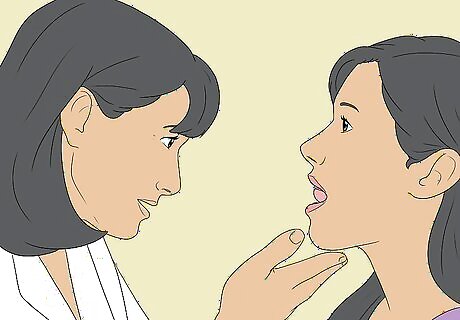
See your doctor if you have mouth pain along with a fever or rash. Mouth sores or pain along with other symptoms that affect your whole body could be a sign of a widespread infection. If you have sores or pain in your mouth along with a fever, skin rashes, swollen glands, or a general feeling of being unwell, call your doctor right away. If you have pain or inflammation in your eye along with painful sores in your mouth, call your doctor immediately or go to an urgent care clinic. This can be a symptom of a more serious condition, such as Behçet disease or a herpes infection that has spread to the eye.
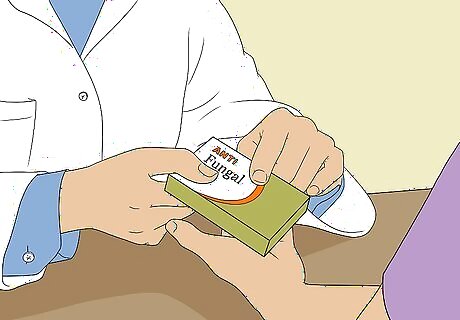
Get help for mouth sores if you have a weakened immune system. If you have a medical condition that affects your immune system, such as HIV, diabetes, or cancer, call your doctor if you develop sores or pain in your mouth. They can help you manage any secondary infections that might be causing the problem, or help prevent a more serious infection from developing. For example, oral thrush infections are more common, and more serious, in adults who have compromised immune systems. Your doctor can prescribe anti-fungal medications to help get the infection under control.
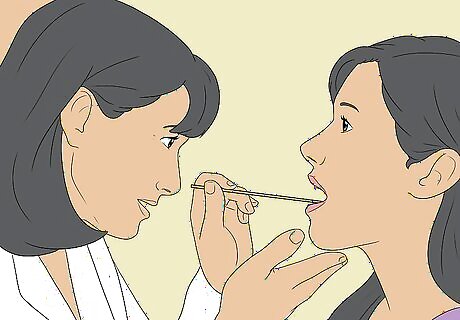
Seek medical attention if you have severe, unexplained, or long-lasting pain. Have your doctor check out any mouth pain that’s severe enough that you have trouble eating, speaking, or swallowing. Even pain that’s less severe can be a sign of a more serious problem, so see your doctor if you have any concerns or aren’t sure what’s causing the pain. Have your doctor or dentist check out sores that don’t get better within 2 weeks, or that keep going away and coming back. In rare cases, persistent sores or pain can be a sign of a serious condition, like mouth cancer. If your doctor suspects oral cancer, try not to worry. Fortunately, these cancers are usually very treatable, especially when they are caught early.
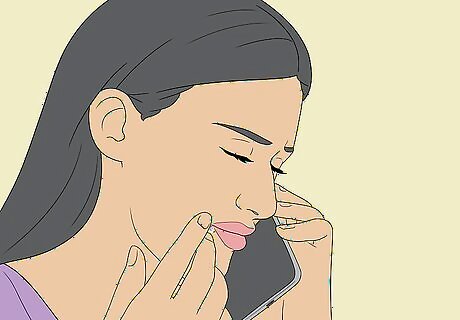
Call your doctor if you have signs of an infection in your mouth. If you notice any signs of an infection, such as swelling, heat, tenderness, or pus draining from the affected area in your mouth, call your doctor or dentist immediately. They may prescribe antibiotics to help treat the infection or recommend a dental procedure to treat the problem (such as a tooth extraction for a severely infected tooth). Other signs of an infection in your mouth include: A fever Swollen glands in your neck or jaw Swelling of your tongue, gums, or jaw Bad breath or a bad taste in your mouth
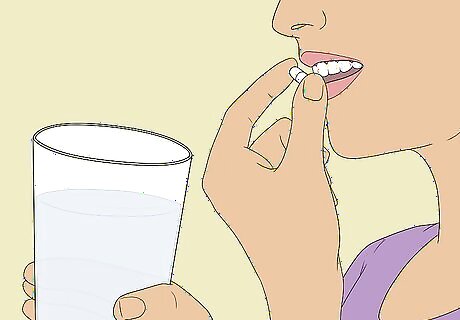
Take any medications as prescribed by your doctor. Depending on what’s causing your mouth pain, your doctor might prescribe medications or recommend an over-the-counter treatment. Always follow your doctor or pharmacist’s instructions carefully. Never use more than the recommended amount of medication or stop taking a medication without consulting your doctor. Different causes of mouth pain require different treatments, so talk to your doctor about which medication is most appropriate for you. For example, if you have a severe cold sore, your doctor may prescribe antiviral ointments or pills to treat it. For sores caused by a fungal infection, like thrush, you may need to use an anti-fungal mouth rinse or pills. Give your doctor or dentist a full list of any other medications or supplements you’re currently taking, since this could affect what you can take safely.




















Comments
0 comment